OUTREACH ACTIVITIES
ENGAGING YOUNG MINDS THROUGH COMPUTING
The Outreach Committee assists academic staff, postdoctoral researchers, and postgraduate research students to participate in UK-wide outreach and public engagement activities. This page showcases some of the local engagement initiatives recently supported by the Committee. If you have an idea for a public engagement activity that you’d like to pursue, please get in touch with the SoCS Outreach Committee at
Committee members
- Dr Mireilla Bikanga Ada (co-Chair)
- Dr Sofiat Olaosebikan (co-Chair)
- Dr Dejice Jacob
- Dr Chris McCaig
- Dr Joseph O'Hagan
- Dr Maria Kallia
- Oliver Summerell (PhD Representative)
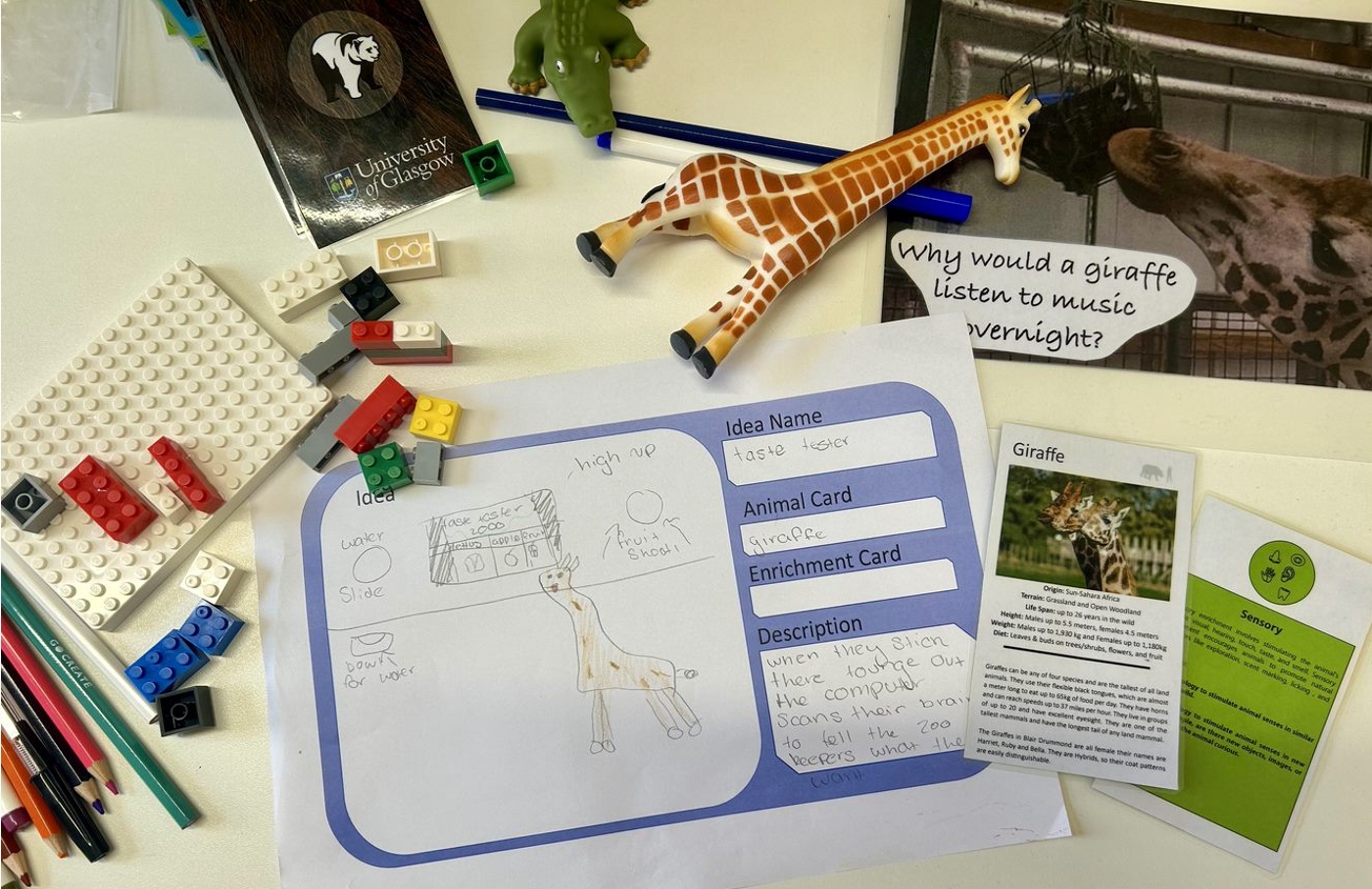
Falkirk Council's In the Wild Day
The Animal-Computer Interaction group at the University of Glasgow was invited to hold an event for children as part of Falkirk Council's In the Wild Day. The booth was run by Dr Ilyena Hirskyj-Douglas and Dr Mireilla Bikanga Ada, who invited children to play a card game where they picked an animal card and an enrichment card and then imagined future technologies for animals in the zoo. Children were able to draw or build their creations from Lego or playdough, supported by Dr Hirskyj-Douglas's knowledge of animals and computing, which provided a framework for learning about how we keep animals and meet their needs in zoos and beyond. The event was successful, with many children creating designs for the future, including lickable interfaces for giraffes to reveal what is going on inside their minds, and computer-driven climbing frames for tigers to practise jumping and parkour.

Matchings Talk at Francis Parker School, Chicago
As part of Francis W. Parker School’s March Mathness celebration in March 2025, Dr Sofiat Olaosebikan, a Computing Science lecturer and matching theory researcher, was invited to give two outreach talks in Chicago.
DAY 1 (THURSDAY 27 MARCH): The first session was with around 50 pupils aged 9–11. Dr Olaosebikan began by sharing her journey into computing — from receiving her first desktop computer at age 15 in Nigeria, studying mathematics as an undergraduate, and discovering programming during her MSc in Ghana, which ultimately led her to pursue a Computing PhD in Glasgow.
She gently introduced the idea of matching problems using a relatable example: assigning doctors to hospitals. The students then took on a paper-based game where they had to find an optimal matching between 7 doctors and 3 hospitals. Impressively (though not surprisingly) many solved it within seconds. Dr Olaosebikan linked this playful activity to Match Day in the U.S., where over 45,000 doctors are assigned to residency programmes using algorithms. When asked if the students could manually match that many doctors in seconds, they unanimously shook their heads — setting the stage for a brief but powerful introduction to algorithms and computational thinking. She also touched on real-life life-saving applications like kidney exchange algorithms, sparking thoughtful questions and engaged discussion from the pupils.
DAY 2 (FRIDAY 28 MARCH): The second session welcomed around 500 pupils aged 11–18. Dr Olaosebikan used practical examples (matching pupils to schools, organs to donors, and even dancing partners at a Jane Austen-style ball) to introduce key concepts in matching theory. Pupils were given preference lists and asked to find a stable matching. One student managed it in under 120 seconds.
She introduced the Gale–Shapley algorithm, demonstrating it through an interactive example and then showing its Python implementation. She also highlighted how subjects the pupils already study — including discrete maths, linear algebra, optimisation, and proofs — connect directly to this field of research. The talk concluded by noting the real-world impact of matching theory, including its role in winning the 2012 Nobel Prize in Economics.
Dr Olaosebikan’s sessions were lively, engaging, and left a strong impression on both students and staff — so much so that she received an open invitation to return to Chicago in 2026.
Photos and coverage from Francis W. Parker School available here:
https://www.fwparker.org/news-detail?pk=1564066
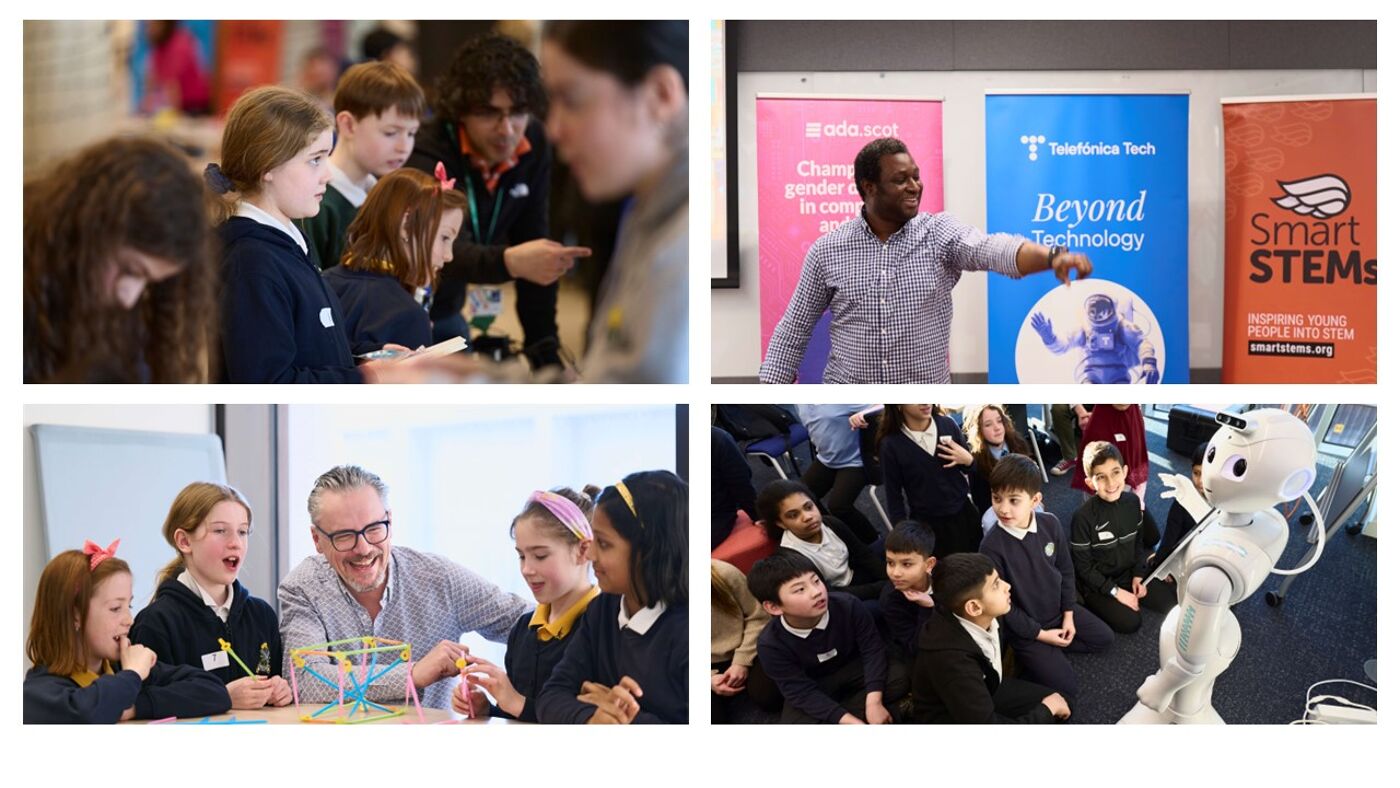
SmartSTEMS Hub Event
On Wednesday 15 January, the third collaboration between SmartSTEMs, Ada Scotland Festival and University of Glasgow School of Computing Science (SoCS) brought together 150 school children from neighbouring schools and ten industry partners for a day of insightful and fun activities to inspire, engage and challenge young people to think differently about STEM.
The event was wonderfully hosted in the University of Glasgow Advanced Research Centre with the support of the amazing events team. The day consisted of hands-on workshops, competitions and an exhibition with interactive displays and activities that took over the atrium. Some amazing prizes were awarded at the end of the day and there were many happy faces to behold amongst the exuberant young people. Each school group had a volunteer from the SoCS looking after them throughout the day and Andrew Blair returned to run his hugely popular robot workshop.
Thank you to our colleagues for giving up their valuable time: Heather Cassells, Gethin Norman, Chris McCaig, Sana Hafeez, Sarah Smith, Una Marie Darragh, Oana Andrei, and Carron Shankland. The industry-led workshops were delivered by: Telefónica Tech, GEMINOA, Howden, JPMorganChase, Strawbees, and Rolls-Royce. A massive shout out to the unstoppable SmartSTEMs team, whose energy knows no bounds Heather Donnelly, Edidiong Akpan and Donna Walton and to Telefónica Tech who were the lead sponsor for this event.
Matthew Barr, Claire Johnston, and Anna Doyle are already in planning with their SmartSTEMs colleagues for future collaborations to deliver meaningful and insightful experiences in STEM for young minds, creating our tech talent of the future.
SmartSTEMs “core aim is equity of access and opportunity for all young people; where new and strong connections between education and industry lead to expanded skills, career options and networks.” https://smartstems.org/
Ada Scotland “building gender balance in computing science” https://ada.scot/
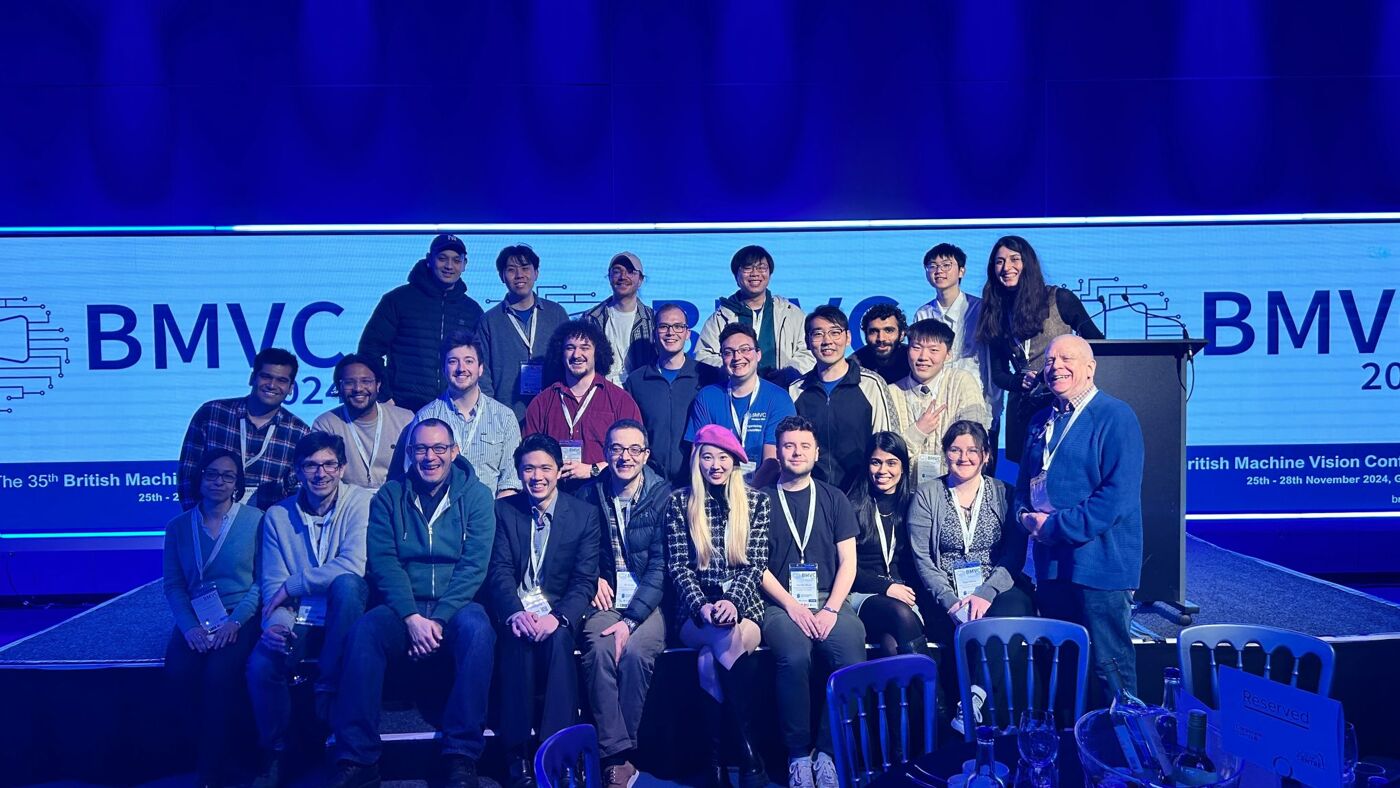
British Machine Vision Conference
The annual British Machine Vision Conference (BMVC) was recently held in Glasgow, from the 25th to the 28th of November 2024. The event was organised by Dr Gerardo Aragon-Camarasa and Dr Edmond Shu-lim Ho alongside an organsing team from the Computer Vision and Autonomous Systems and a team of PGR students from the School of Computer Science who all ensured the event ran smoothly.
With 519 attendees, 263 papers, 8 workshops and a doctoral consortium over the course of the 4 days, the conference is considered to have been a resounding success. The papers published ranged from segmentation in medical imaging, to depth estimation, to inpainting methods and everything in-between! Notably, there were also 4 keynote presentations on robotic vision (Prof Margarita Chli, ETH Zurich), privacy in AI (Prof Mubarak Shah, University of California), video understanding (Dr Laura Sevilla-Lara, University of Edinburgh) and 3D GenAI (Federico Tombari, Google).
Four sponsors Technovative Solutions LTD (TVS), VIVO, Living Optics and Nokia Bell Labs also attended the event, each having a booth with which to represent their company.
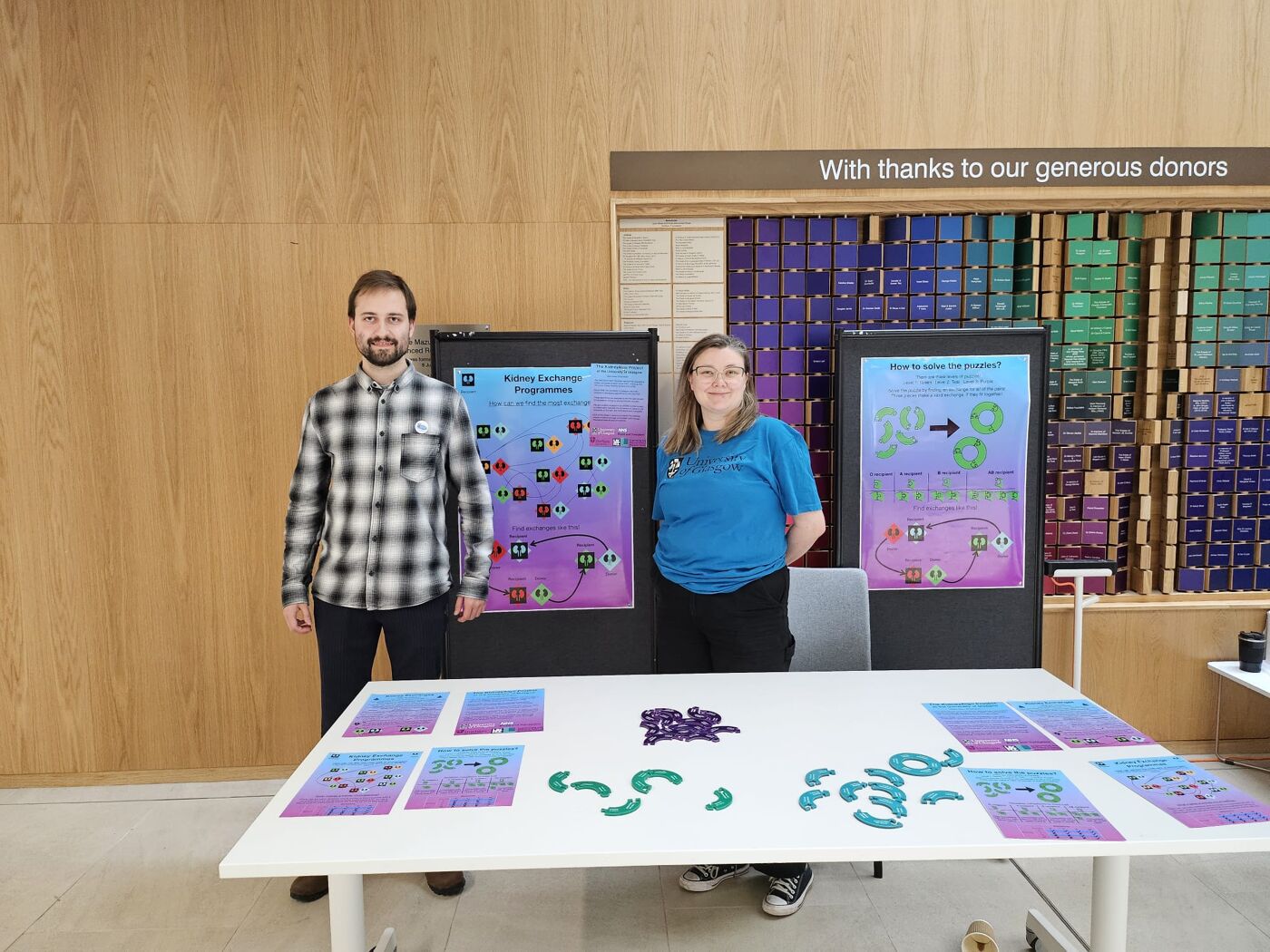
Kidney Exchange Puzzle at Explorathon Event
Dr Rachael Colley and Danielius Sukys participated in the Explorathon event in September 2024, where they talked to the public about their work with the NHS Blood and Transplants' Kidney Exchange Programme.
The puzzle shown involves constructing kidney exchanges using pieces manufactured by our very own Mechanical Services Unit at UoG. The design was based on a game created by Dr and the online version can be accessed here.
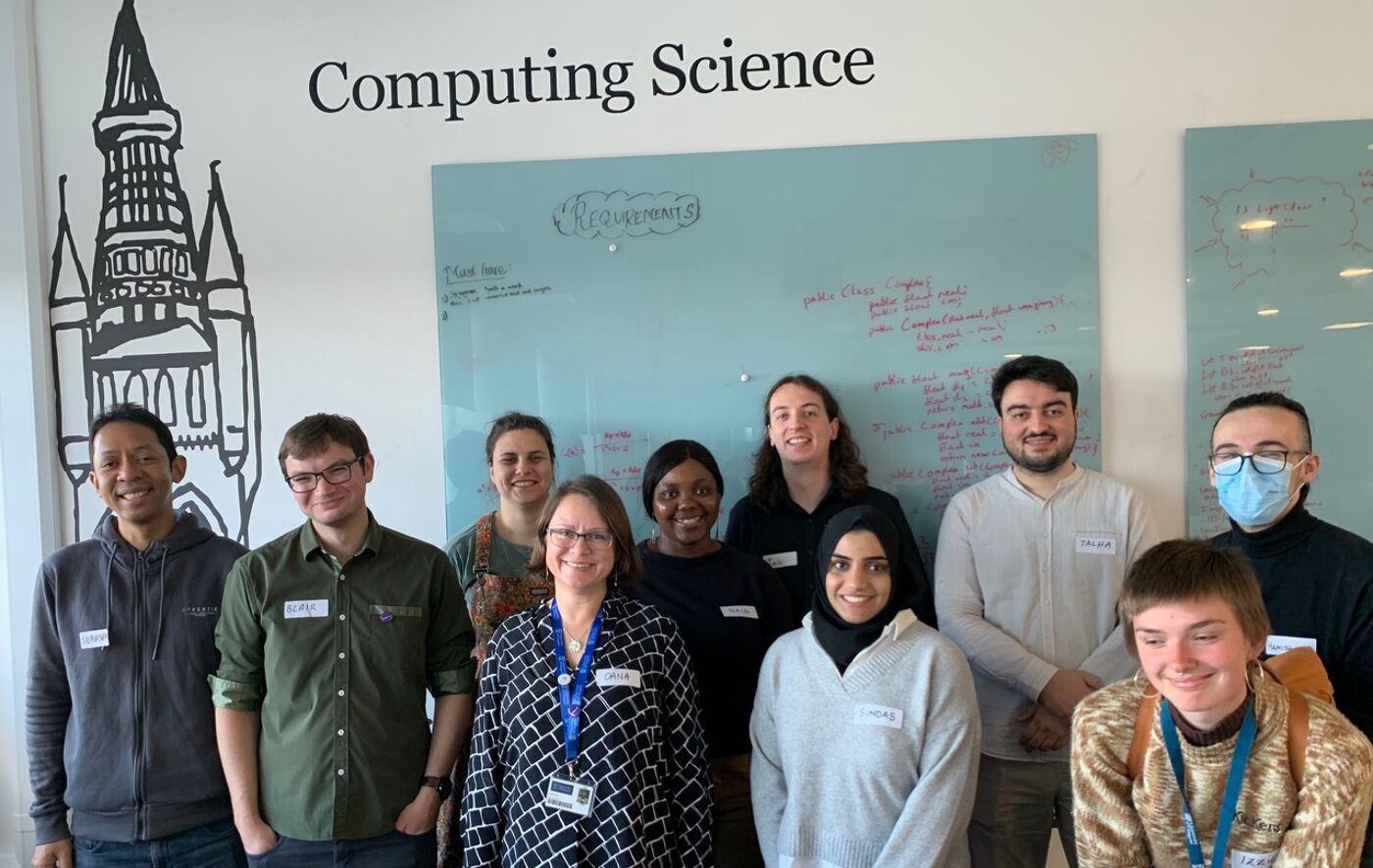
Quantum Technology School 2024
On the 10th and 11th of September, Oana Andrei and Blair Archibald ran the Cryptography Workshop as part of the Quantum Technology School (QTS) at the University of Glasgow. QTS is an event series organised by Dr Peter Sneddon, Dr Sarah Croke, Dr Adetunmise Dada, and Dr Fiona Speirits from the School of Physics and Astronomy, and is aimed at pupils studying Physics or Computing Science at Higher or Advanced Higher at the time of the School. In addition to highlighting this emerging field to both pupils and teachers, it is intended to give pupils who may be interested in continued study in Physics, Computing Science, or Engineering a flavour of University life. This year, we hosted 156 pupils from 21 schools, accompanied by 16 teachers, with 43%/57% F/M gender split.
During each of the four sessions of the workshop pupils explored the foundations of cryptography through hands-on pen-and-paper activities. Quantum computers could break many of today’s encryption methods, but they also open the door to more advanced cryptographic techniques. These pupils could be the generation that helps build the secure systems of the future!
This workshop was made possible with the support of the School of Computing Science, with many thanks in particular to the enthusiastic GTA team: Agnes Ola, Elisabet Tammjarv, Iain Christie, Luka Senic, Hamish Clark, Peace Ayegba, Sundas Mulkana, Surasak Phetmanee, Talha Enes Ayranci.
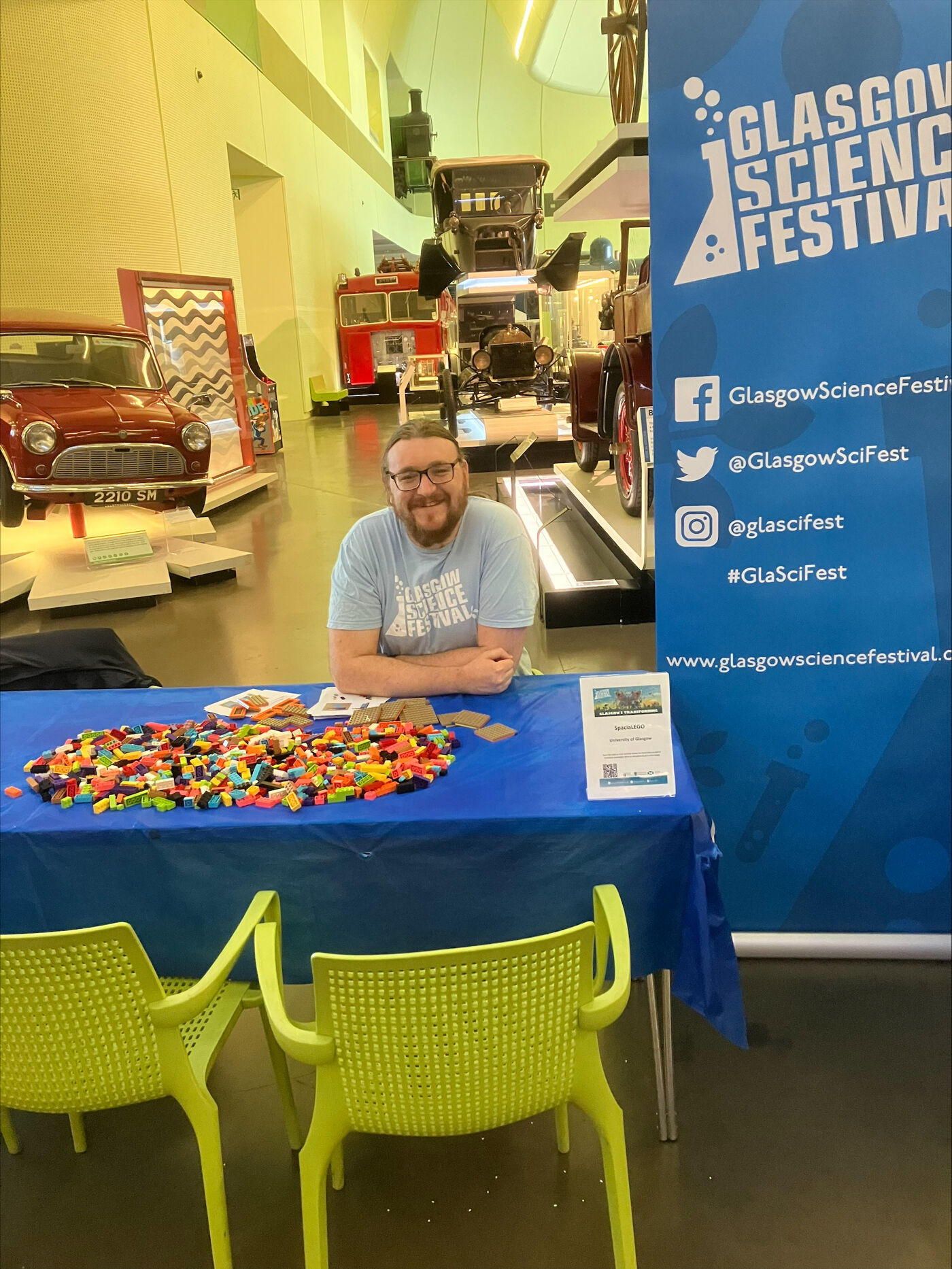
Glasgow Science Festival (Spatial Lego)
Dr Jack Parkinson was at the Glasgow Science Festival in summer of 2024 with an event called SpatiaLEGO. He has previously taken this event to Explorathon in 2023 and also got it out at the School of Computing Science Christmas party in 2023! The activity involves using LEEGO to build - sometimes complex - structures from orthographic views, meaning that you need to create a mental model of the object from multiple perspectives to figure it out. The activity is part of his wider work looking at developing spatial skills for CS, and wider STEM, improvement.
Dr Parkinson was at the Riverside Museum every day of the Glasgow Science Festival, which is a multi-location event across the city with activities across all domains. With a brilliant team of volunteers from the School, they saw hundreds of kids (and their parents) who had a go at the challenge. It was really well received and helped him to learn a lot about how people interact with spatial challenges, and also helped him to get his message out to the public. It can sometimes be difficult to convince people that spatial skills are useful for learning in STEM, but having an activity like this stretches peoples' brains in just the right way for them to see that it's quite a tough cognitive challenge, just like if they were trying to understand a conceptual model or an abstract relationship.
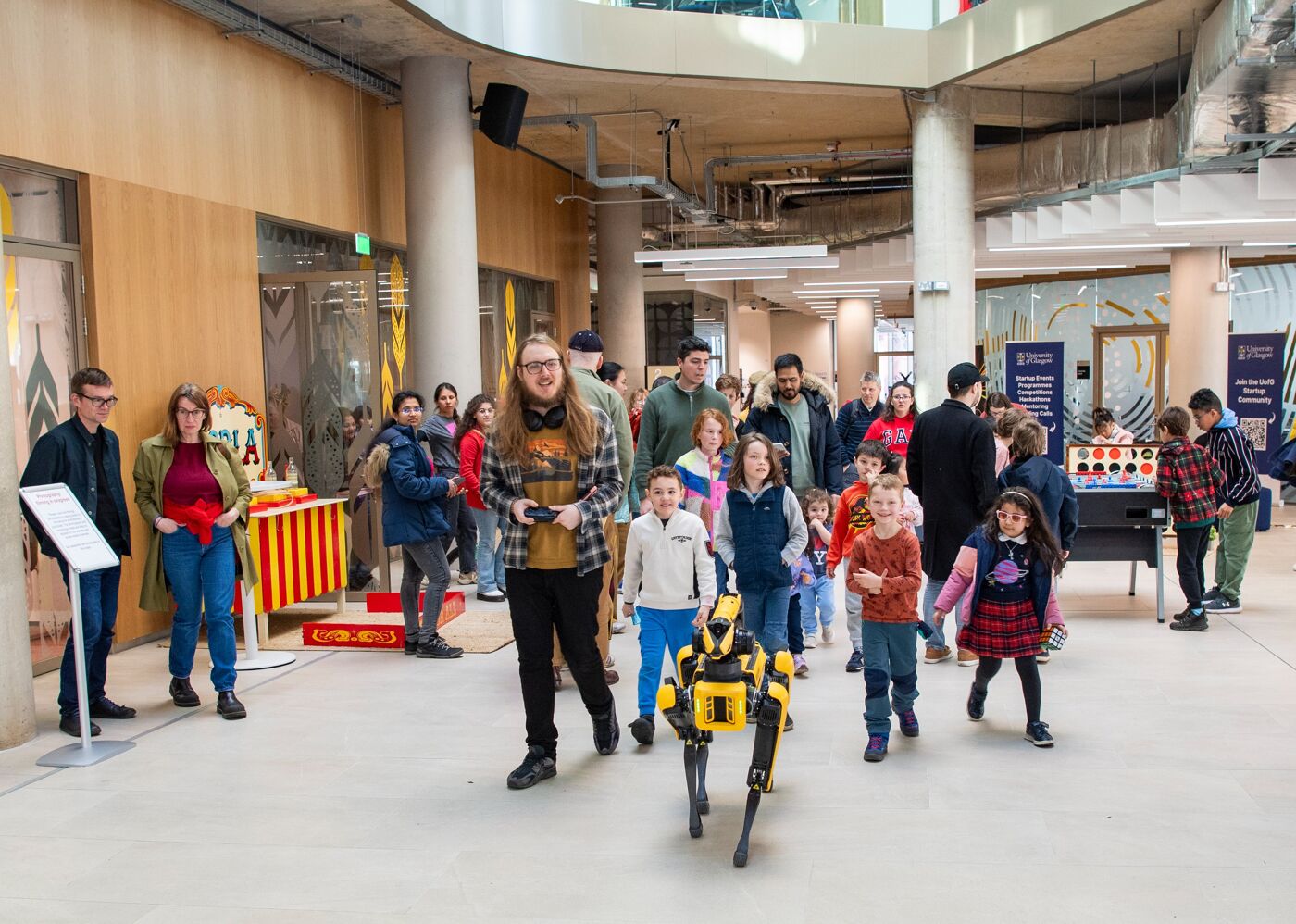
Quadruped Robot at the 2024 Spring Fling
At the 2024 Spring Fling event held in the ARC in March 2024, the School of Computing Science’s Dr Emma Li, and two of her PhD students, Abdul Alshememry (School of Computing Science) and Haralambos Dafas (School of Computing Science, Social AI CDT) showcased Spot, a quadruped robotic dog.
It is a clear trend that over the coming years quadruped robots, which offer great mobility, will be adopted across different sectors, including industry, logistics, hospitality, and healthcare/social care. People across these sectors will be expected to work closely alongside such quadruped robots. As such, Emma, Abdul and Haralambos are working on various research projects to establish how best humans can effectively interact and collaborate with quadruped robots.
The public were able to interact with Spot via simple dog-like activities such as playing fetch. This not only demonstrated Spot's current capabilities, but also proved that robots such as Spot can undertake tasks that can be more useful than mere entertainment, e.g., assisting individuals with impaired mobility in picking up objects from the ground.
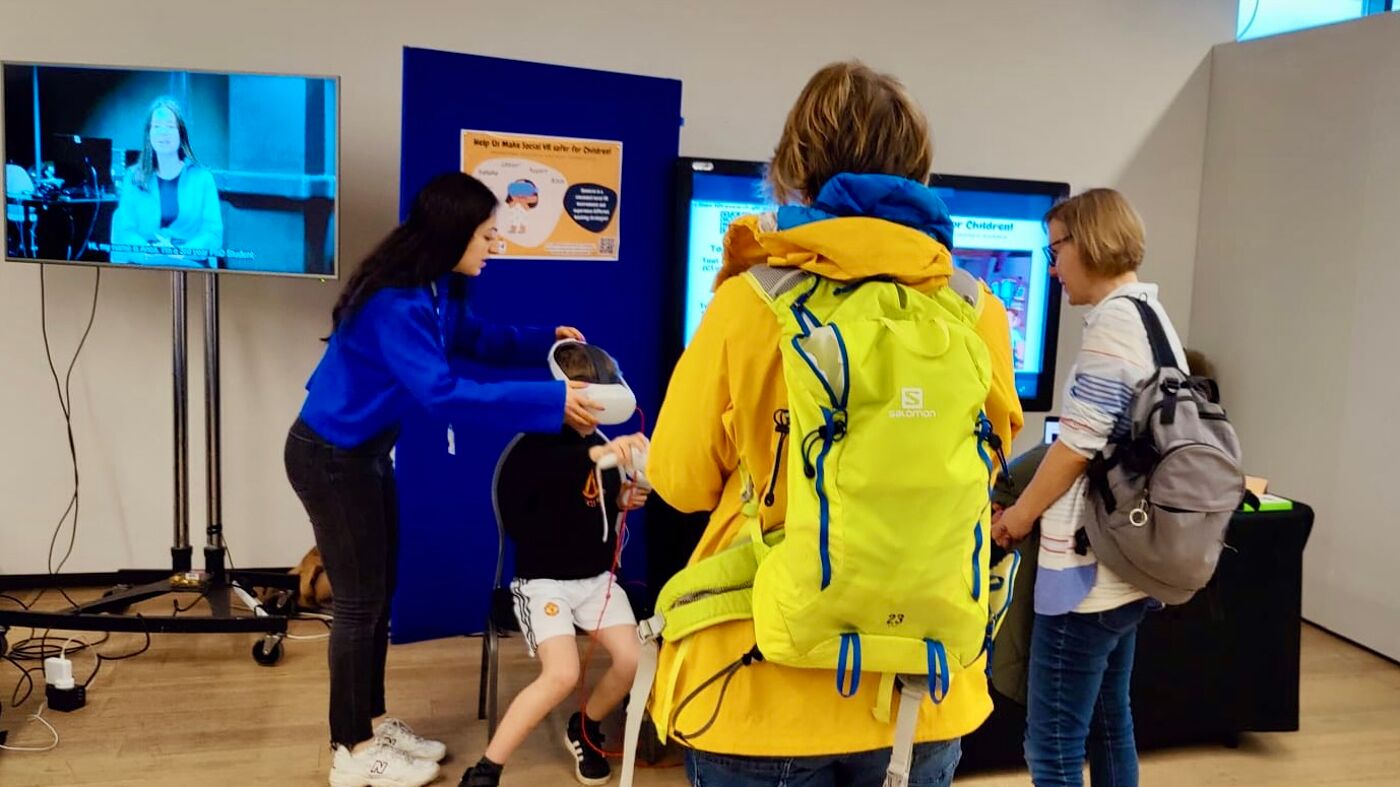
REPHRAIN Festival of Privacy
Children today are growing up in an increasingly connected world, influencing how they interact, communicate, and socialise. With the rise of Social Virtual Reality (VR), these immersive and embodied experiences have become more accessible to children. Cristina Fiani, a PhD student at the University of Glasgow, working within the social AI CDT, focuses her research on safeguarding children in social VR environments.
While current safety features such as blocking, muting, personal space bubbles, and reporting exist, they often place the burden of action on children, who may not have the maturity to respond appropriately. Additionally, human moderators on some social VR platforms cannot address all incidents or be present around the clock.
To address this, Cristina proposes an alternative child-friendly solution called “Big Buddy,” an Automated Embodied Moderator (AEM). This Wizard-of-Oz prototype is an AI-Agent designed to safeguard children during disruptive situations in social VR. The concept stems from the idea that children might prefer having an older sibling or buddy assist them in harassment situations, especially since VR headsets obscure reality from parents and actual siblings. An automated and embodied version of this “buddy” can help children feel safer.
In a prior study, children aged 8-16 years old reported feeling significantly safer when Big Buddy was present and took action during disruptive events. For more details about Cristina's project and publications, please visit www.cristinafiani.com.

Ada Scotland Festival
The Ada Scotland Festival aims to champion gender diversity in Computing Science, and is comprised of a series of events aimed at women of all ages – but especially school-age girls – every October. While the Festival’s partners deliver events and activities across Scotland during the main festival, it’s always tricky to include everyone: in the Highlands, for example, the distances required to travel to an event can be prohibitive. With this in mind, our Festival Manager, Anna Doyle, hatched a plan to run a mini-festival in Inverness and to bus in school kids from across the Highlands for a day of hands-on computing activities. And so, Anna and Matt travelled up to Inverness in mid-February to put this plan into action.
The kids travelled from as far afield as Ardnamurchan High School, Dornoch Academy, and Grantown Grammar, and were treated to lunch (plus an endless supply of biscuits) to see them through the day’s activities. These activities – featuring Spheros, micro:bits, and video game nanobots – were delivered by partners including the Scottish AI Alliance, Barclays, UHI, Skills Development Scotland, and the SQA. The feedback from teachers and pupils alike was brilliant, and we aim to run a similar event in the Highlands next year, as well as expanding to establish a mini-festival in the Borders in 2024.
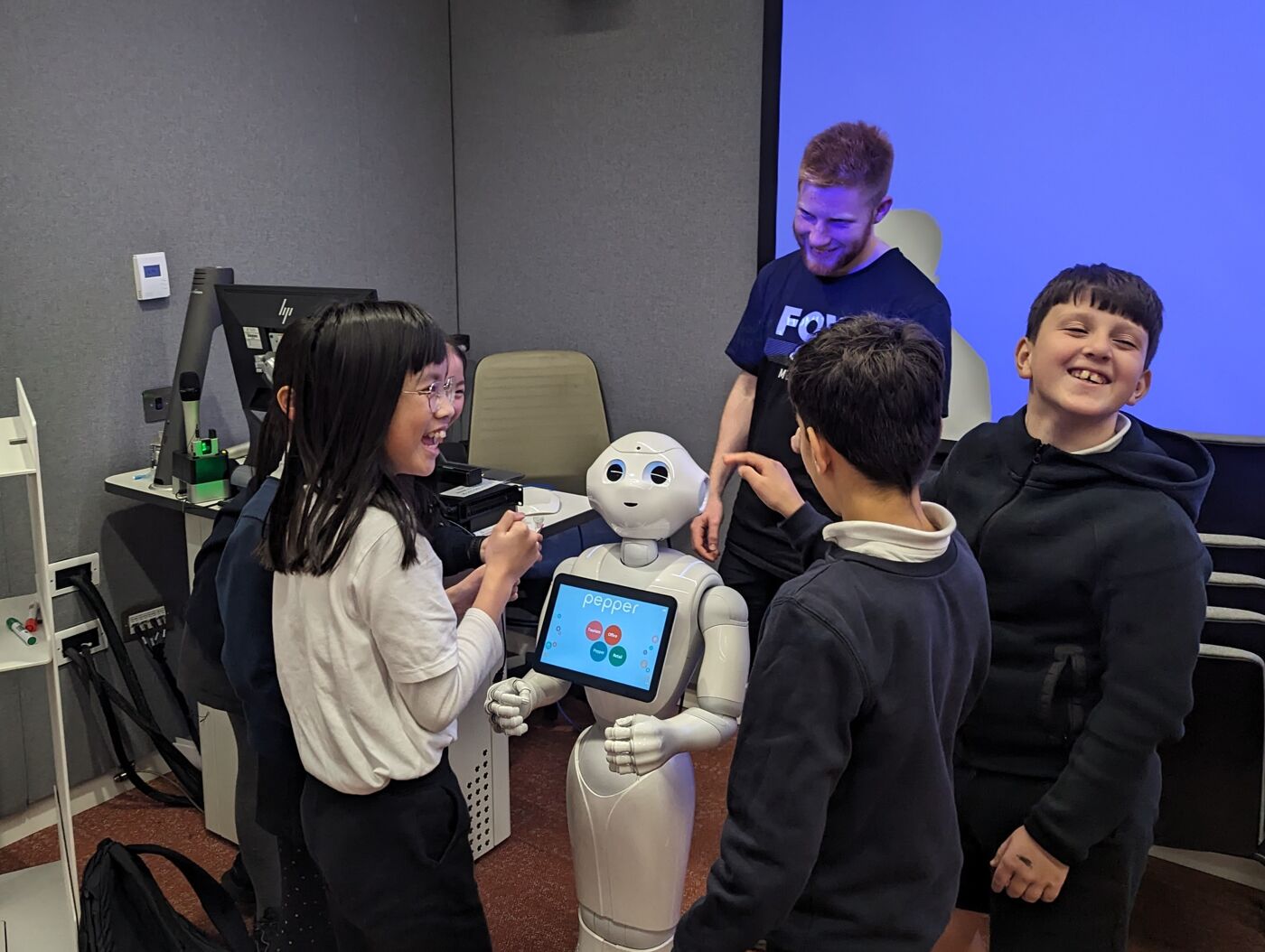
SmartSTEMS collaboration
SmartSTEMS is a Scottish charity that aims to ensure young people – regardless of gender, background, ethnicity, or religion – have equal and fair access to STEM education and career opportunities. Working in collaboration with education and industry, SmartSTEMS facilitate the delivery of ‘hub events’, designed to engage young people aged 10-14 in STEM activities. On 14 December, the School of Computing Science’s Anna Doyle and Dr Matthew Barr hosted the University’s first SmartSTEMS hub event, building on our previous Ada Scotland Festival collaborations. The hub event involved colleagues from Engineering, Maths & Statistics, and Computing Science delivering hands-on workshops to 130 school children across a number of campus venues, including the ARC. Workshops were also delivered by industry partners including JP Morgan, Turnkey, and Howden.
In addition to the workshops, there were employer stalls, prizes, and presentations, including a talk from Megan Gallagher, who recently graduated from our Graduate Apprenticeship in Software Engineering and continues to work as a software engineer at Leidos. Another former Graduate Apprentice, Andrew Blair – now pursuing a PhD in the School of Computing Science – delivered a much talked about session with Pepper the robot.
Anna and Matt are now talking to SmartSTEMS about another, larger event, aimed at slightly a older age group. Please do get in touch (Anna.Doyle@glasgow.ac.uk or Matthew.Barr@glasgow.ac.uk) if you’d be interested in taking part!

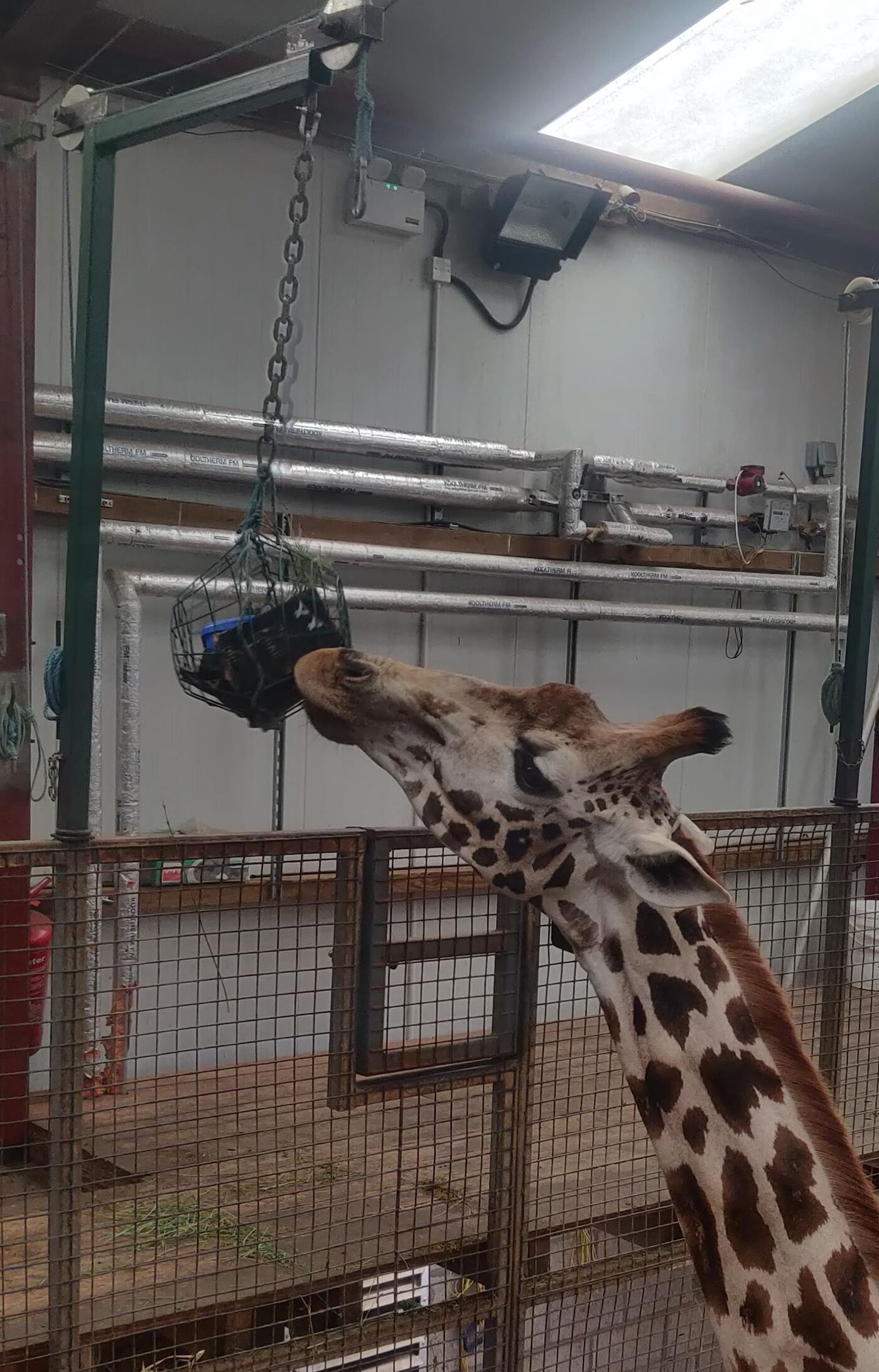
Blair Drummond Zoo and Safari Park
Dr Ilyena Hirskyj-Douglas research and develop new animal-computer systems. She has been working with Blair Drummond Zoo and Safari park since 2021. She has published papers from this collaboration, one at ISS'23 on giraffes, which won an honourable mention award. So far, she has been developing technologies viewable by the public and designed to increase visitor education and for animals to investigate their behaviours with computer devices and featuring on their website https://www.blairdrummond.com/conservation/research/
When she has technologies in the zoo, the zoo sometimes puts up signs about the technologies if they are viewable by the public. She received a fellowship from the Royal Society of Edinburgh in 2023 to work with the zoo to develop these to help towards Scottish educational offerings and she has given talks/written for the British Association for Zoos and Aquariums (BIAZA), the regulating body on technologies developed at zoos, as part of this work on how to build zoo tech. She has also participated in the Glasgow Science Festival looking at animal tech for children. Further, her research with them has been featured on STV news, The Scotsman, etc. Finally, PhD, interns and Level 4/5 students have been involved in this collaboration and won best thesis awards for their research at the zoo.
Above are some photos to give an idea of the technologies her group develops; a tangible touch-based device for giraffes that plays audio to giraffes when licked/head-butted and a chimpanzee heating device so they can warm up and stay outside longer triggered by standing on a projected square of light (they use it sometimes to warm their mouths hence the photo!).

